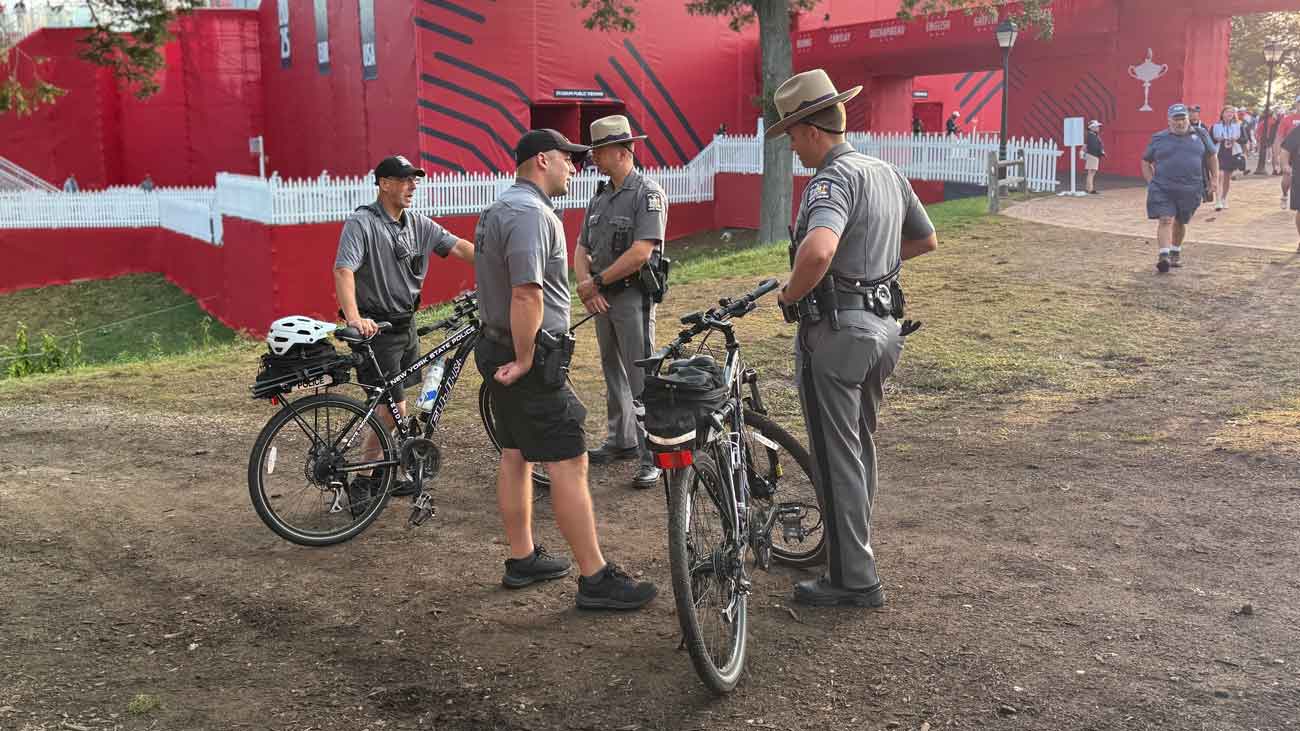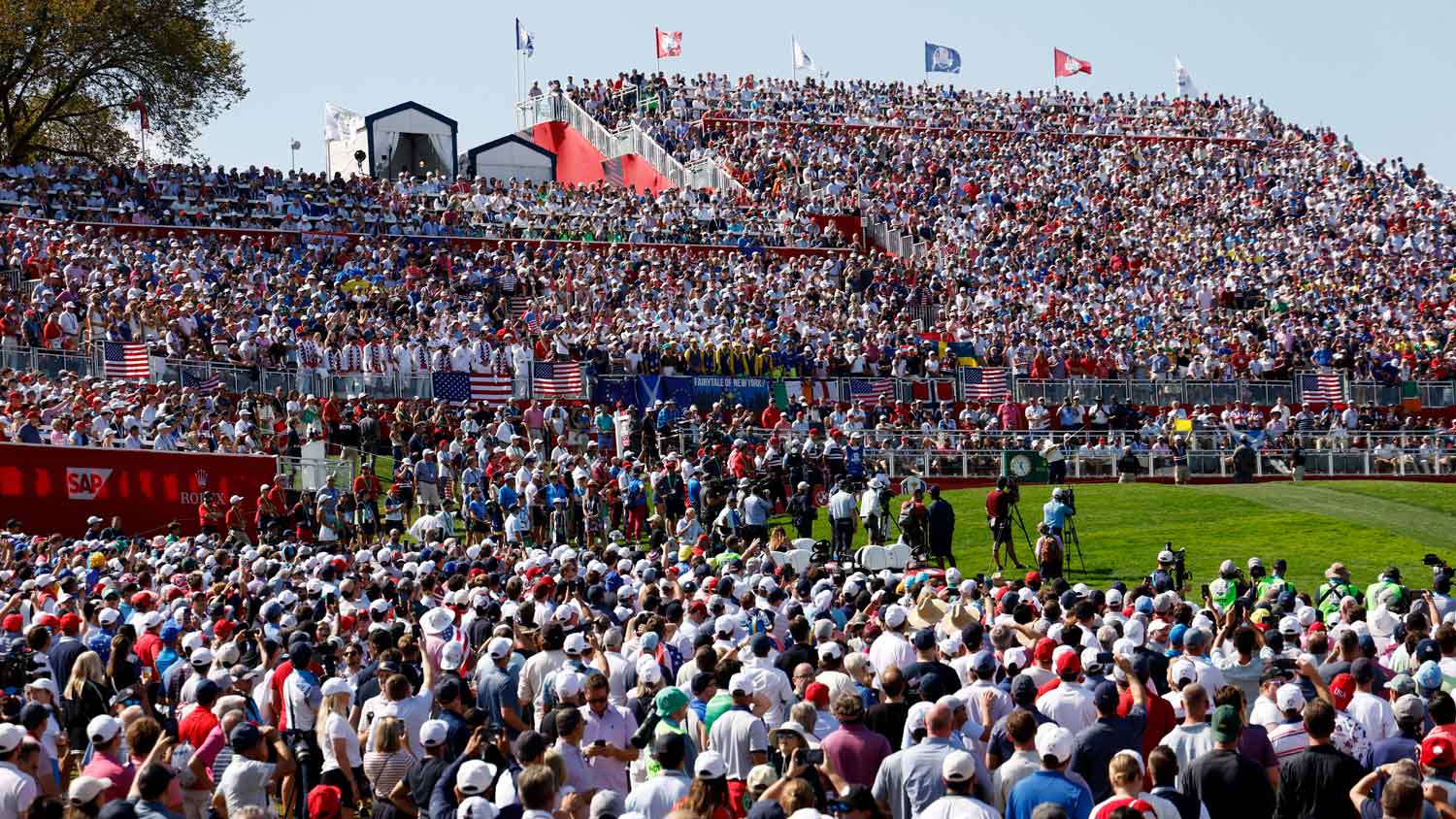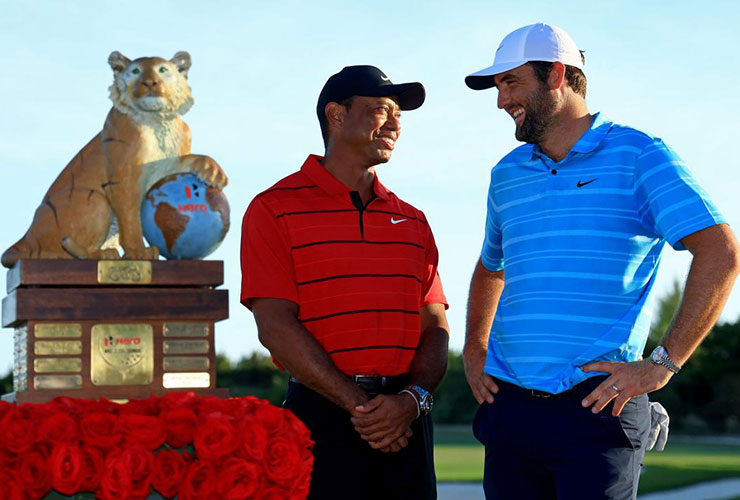The best golf events linger in our minds for all the right reasons. Tom Watson at Turnberry in the hot summer of ’77, Donna Summer’s “I Feel Love” on car radios all over the world. Big Jack, Augusta, ’86, as he turned back time. Faldo-Norman, a decade later, a study in sportsmanship. Tiger’s 15-shot win at the Open at St. Andrews, in 2000, a study in superiority. The Presidents Cup in South Africa in 2003, the one that ended in a tie at nightfall. Great Moments in Golf.
And then there is this most recent Ryder Cup: Bethpage ’25, lingering for all the wrong reasons.
Tom Watson, as a former American Ryder Cup player (four times) and captain (twice), feeling compelled to apologize to the Europeans, our guests, even though he had no direct connection to this year’s event. “I am ashamed of what happened,” Watson said.
The profane chants by American fans, on the first tee and through the course. A beer tossed (or knocked) in the direction of Rory McIlroy’s wife, Erica. The blanket of litter on this gorgeous public course, part of a vast state park, as litter bins were overloaded and then some. In that, the Ryder Cup brought to mind the New York City sanitation workers strike in 1968. I can recall the mountains of trash in front of my grandparents’ apartment building on the Upper West Side that winter.
Let’s not overdo it. It wasn’t like this Ryder Cup was overrun by hooligans, as European football sometimes is. In “Among the Thugs,” Bill Buford captures fanatical fans turning into violent mobs in stunning detail. No scene at Bethpage Black was anything like that. But if the event didn’t make you worry about golf’s direction, you’re asleep at the wheel of your E-Z-GO.
“As a native New Yorker, I feel like I should apologize for what you endured,” I told Rory McIlroy Sunday night. I was actually relieved the Europeans won. The stunning American reversal in Sunday’s singles turned what could have been a European blowout win to a bugs-on-your-skin nailbiter and a 15-13 final tally. The right team won. An American victory would have been a reward for boorish American behavior. It would have encouraged more of the same.
“That’s OK — it’s all good,” McIlroy said. His white team shirt was soaked with sprayed Champagne. I first met McIlroy when he was 19. You’re tempted to say you knew then that he was destined for this big life but a career in golf guarantees nothing. “Anyway,” McIlroy said, “you live in Philadelphia now.”
Because, you know, nothing like this could ever happen in Philadelphia.
The PGA of America is coming to Philadelphia in nine months for its next international golf event, the 2026 PGA Championship at Aronimink, a stately club on Philadelphia’s Main Line (and 10 miles from a new Tiger Woods learning center at Cobbs Creek, a public course in the city limits). This here-before-you-know-it PGA Championship will provide the PGA of America with a chance to trot out all manner of new-and-improved.
On a higher level, this PGA will give fans an opportunity to show its understanding of one of golf’s most enduring qualities, mannerliness. The British Open does that every year. The Walker Cup does it every other year. Olympic Golf does it every four years. The PGA of America, for well over a century now, has hosted hundreds of exemplary events, for every level of golf. But this most recent Ryder Cup, golf’s biggest event, got away from them. You learn from your mistakes, right? That’s Life 101. In every aspect of life, including our backswings, we all know the importance of making adjustments. The next stateside Ryder Cup is in 2029, at Hazeltine. You walk through a 100 farms from downtown Minneapolis to get there.
On Friday at Bethpage, I interviewed a veteran New York State Park officer, Lt. Kory Barney. He was one of 12 officers patrolling the event by bike, and there were hundreds of other officers on hand from various law enforcement agencies. On Friday, there were scores of Secret Service officers, as Donald Trump became the first sitting president to attend a Ryder Cup.
Barney has worked other golf events at Bethpage. I asked, on that Friday afternoon, if he had ever been on his bike inside the ropes. “No, never,” he said.

Policing the Ryder Cup by bike sounds fun. But it’s serious business
By:
Michael Bamberger
By Saturday afternoon he was. The various law enforcement agencies made a tactical policing shift on Saturday as crowd behavior on a warm afternoon crossed the line from partisan and jingoistic (excepted) to crude and vulgar. We live in crude times.
We really do. We live in crude times. Anybody you don’t agree with, anybody who has a different world view, is a d*ck these days. People, men and women, use that word like it’s nothing.
Ryder Cups are always intense, in their build-up, in their play, in their aftermaths. In a pre-event press conference, Collin Morikawa, a mild-mannered Californian, said this: “I’ll be honest, I think it’s kind of tame so far. I hope Friday is just absolute chaos. I’m all for it. I think it feeds into who we are, as American players and the American team. We want it. We want to use that to our advantage.”
No. No, no, no, no, no.
Morikawa is a bright young man who knows that words matter. You could say that golf does chaos well, inside the ropes on Sunday afternoons when leaderboards are tight and mistakes kill. Most players are freaking. The greatness of Jack Nicklaus and Tiger Woods was how still and focused they became when things were going haywire for the other guys. Heightened fan interest stems from this tingly intensity, this particular inside-the-ropes chaos.
Quick aside: One of the few moving things I saw on Saturday afternoon at Bethpage was Morikawa and Harris English walking the fairways together. Neither was playing. As (one can say in retrospect) an ill-considered alternate-shot team, Morikawa and Harris endured resounding losses on Friday morning and again on Saturday morning. But there they were on Saturday afternoon, attached at the hip, cheering on their fellow Americans. They could not have been feeling on top of the world. They likely wanted to be in a dark, quiet cool room, but they were out for all to see. A little glimpse into what Ryder Cup golf is all about.
But Morikawa’s comment about chaos was beyond ridiculous. Not what Ryder Cup golf is all about.
Tom Watson’s public apology was striking but not surprising. When I came of golf age as a teenager in the mid-1970s, Watson was the most exciting thing in golf and I was drawn to him, as many young fans were. Watson played what I took to be real golf, make-no-excuses golf. Later, as I got to know him as a reporter, Watson struck me as a man who wanted the world (to borrow a phrase) to be at a sort of moral attention forever. The past half-century, since Watson won his first major — the ’75 Open at Carnoustie — the world has become increasingly coarse. What Watson, in word and deed, is saying is that golf can be an oasis, and it should be an oasis. Golf can choose to be mannerly. We control our destiny here.
In my first decade in the game, I played almost all my golf in Suffolk County, Long Island’s eastern county. (Bethpage straddles the Nassau County-Suffolk County border.) My buddies and I played the village-owned course in Bellport, county courses, state courses, public courses owned by local golf-loving men who were happy to break even. We were all New Yorkers to the core, rooting for (this changed from one house to the next) the Mets, Jets, Rangers and Knicks. The New York sports fan was full-throated, famously so. But golf was different. Golf was a place to practice good manners. I caddied some for my high school principal. He had a regular game with another school principal and a course superintendent. They played for something more than pride, but they were mannerly to their core. It was a value of the game.
Which means it should extend to fandom. At the U.S. Open at Shinnecock Hills in 1986, Greg Norman was heckled some. He was the Great White Shark, an Aussie, too perfect for us. We wanted to see Jack Nicklaus produce some one-more-time magic. We wanted to see Tom Watson win a second U.S. Open, or Raymond Floyd win his first. (He did.) Norman’s hecklers did not persist. They were shut down by other fans, by the police and by Norman. The other majors on Long Island, through the years, were charged, but nothing like this year’s Ryder Cup. Other Ryder Cups I have attended, at home and abroad, were nothing like Bethpage Black, not even ’99 at the Country Club in Boston.
It was a rough three days for Colin Montgomerie. More significantly, American players, along with their captain, Ben Crenshaw, and others, should never have rushed the 17th green after Justin Leonard holed that bomb on Sunday — José María Olazábal had a putt to halve the hole all the while. Poor manners, a moment of self-absorption, but none of it was calculated. Just an over-the-top reaction to an over-the-top moment. It was exuberance. Things settled down quickly. But it is maybe true that bad manners have been a growing thing ever since. The Ryder Cup organizers, on both sides of the Atlantic, oversell the thing, in every way. The mainstream golf press is right there, aiding and abetting, turning an exhibition golf match into Premier League football.
At Bethpage, all 12 American players and their caddies, the captain and his five assistants, plus other team personnel in uniform, could have done way more to silence the hooligans. You raise your arms. You point to the troublemakers. You have a policy by which they are thrown out after their first offense, not just escorted elsewhere. The PGA of America could have had many more crowd-control officers among the fans. It could offer some kind of pep talk on the way in, Austin Powers reciting “Oh, be-have” on an endless reel, something like that.
I would like to see the Nicklaus-Jacklin Concession Award become more of a significant thing, where two players, one from each team, are honored for playing the game, at the Ryder Cup and at 30 other events over the course of the year, in the spirit of our golfing forebears. (This year, Tommy Fleetwood received it, without any fanfare.) In general, the closing ceremony should have some measure of gravitas and formality to it, as it did for years. This year, the PGA of America president, Don Rea, sort of just handed the trophy to the winners. Would have been far better to see the Americans there. Losing with grace is such a part of the game.
One last thing, in praise of the golf fan, at Bethpage Black and at any other tournament. Surely 99 percent of the fans at Bethpage were responsible golf fans. It is such a difficult sport to watch, to start early, go to some distant parting lot, get shuttled in, climb crowded hills all day in the hope of seeing something meaningful when you’re likely to miss most of the biggest moments. Golf administrators in general have no sense of what the ordinary fans endures in the name of seeing the sport they love. As the world becomes more screen-oriented, and AI leaves an ever-bigger impact on our daily lives, the physical effort it takes to watch a golf tournament, and the communal sense that comes out of the experience, will become only more important. The point is golf must figure out a way to make the fan experience way better than it is. Fans should not be taken for granted. Fans should be able to go to a tournament, actually see some golf and get a day-long break from the coarse ways of everyday life.
Michael Bamberger welcomes your comments at Michael.Bamberger@Golf.com







